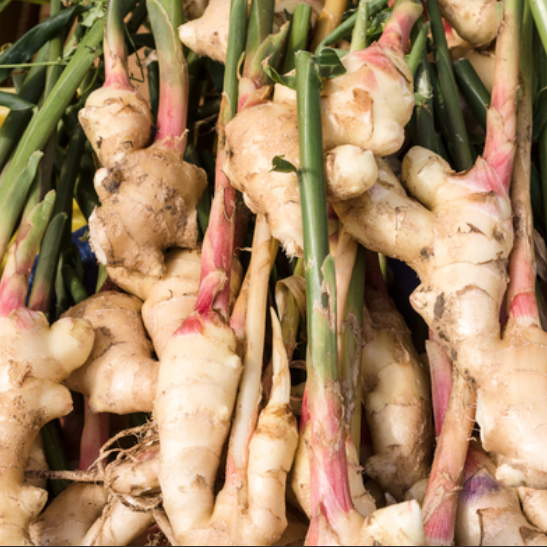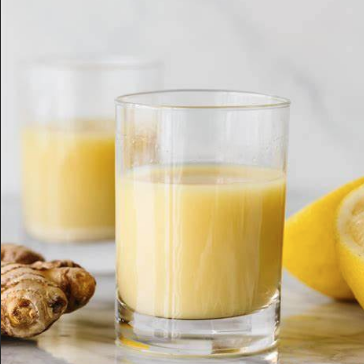
What Is Ginger Good For?
Share
Ginger is a root that has been used for centuries not only as a spice but also as a medicine. It has a distinctive flavor and aroma that can add zest to both sweet and savory dishes. But ginger is more than just a tasty ingredient it also has many health benefits that can support your wellness and may prevent or treat various conditions.
Ginger contains gingerol, a natural compound that has potent detoxification, anti-inflammatory and antioxidant properties. Gingerol has been shown to help reduce oxidative stress, which is caused by an imbalance of free radicals and antioxidants in the body. Oxidative stress shows up in the 9 hallmarks of aging as it can damage cells and contribute to aging and chronic diseases.

Ginger, especially in ginger shot form is a great clean detoxing choice. It can stimulate digestion, circulation and sweating. Some of the health benefits of ginger include:
- Fighting nausea: Ginger can help relieve nausea and vomiting caused by chemotherapy, pregnancy, motion sickness, or surgery. It can also help with bloating and gas by improving digestion and stomach emptying.
- Reducing inflammation: Ginger can help reduce inflammation in the body, which is linked to many conditions such as arthritis, asthma, diabetes, and cardiovascular disease. Ginger may also help with pain relief and stiffness in the joints and muscles.
- Cancer prevention: Ginger may have anti-cancer effects by inhibiting the growth of cancer cells, inducing apoptosis (cell death), and preventing angiogenesis (the formation of new blood vessels that feed tumors). Ginger may also enhance the effectiveness of chemotherapy and radiation therapy.
- Supporting gut health: Ginger can help modulate the gut microbiome, which is the community of bacteria and other microorganisms that live in the digestive tract. The gut microbiome plays a key role in immunity, metabolism, mood, and overall health. Ginger can help balance the gut flora, prevent infections, and heal ulcers.
- Managing cholesterol: Ginger can help lower the levels of LDL (bad) cholesterol and triglycerides in the blood, which are risk factors for heart disease and stroke. Ginger can also increase the levels of HDL (good) cholesterol, which protects the blood vessels from damage.
Ginger can be consumed in various forms, such as fresh, dried, powdered, juiced, or as an oil or supplement. Each form has its own advantages and disadvantages depending on your preference, availability, and purpose.
- Fresh ginger: This is the most natural and potent form of ginger. You can peel and chop or grate fresh ginger and add it to your food or drinks. You can also make ginger tea by steeping fresh ginger slices in hot water. Fresh ginger has a strong flavor and aroma that can enhance any dish. It also has the highest amount of gingerol and other beneficial compounds. We use fresh ginger in Butternut Lentil Bisque, Coconut Golden Milk, Curried Cauliflower, and Staminator.
- Juiced ginger: This is ginger that has been extracted into a liquid form. You can make ginger juice yourself or buy juiced ginger at some health food stores or online. Juiced ginger has a concentrated flavor and potency that can give you a quick boost of energy and immunity. You can have a ginger shot straight up or mix it with other juices, such as lemon, apple, or carrot. You'll find it in our Marathon Protein Smoothie, Flow Botanical Beverage, our wellness shots.
- Ginger oil: This is ginger that has been distilled into an essential oil. You can buy ginger oil at some health food stores or online. Ginger oil has a strong scent and flavor that can stimulate your senses and mood. You can use ginger oil for aromatherapy by inhaling it from a diffuser or applying it to your skin with a carrier oil. You can also use ginger oil for massage by rubbing it on your muscles or joints.
- Dried ginger: This is ginger that has been dehydrated and preserved. You can buy dried ginger slices or powder at most grocery stores or online. Dried ginger is convenient to store and use, but it may lose some of its potency over time. You can use dried ginger to spice up your food or drinks, or make tea by boiling it in water.
- Powdered ginger: This is ginger that has been ground into a fine powder. You can find powdered ginger in the spice aisle of most grocery stores or online. Powdered ginger is easy to measure and use, but it may have less flavor and aroma than fresh or dried ginger. We recommend using it for baking.
While there is no official recommended daily dose of ginger for everyone, as it may vary depending on your age, weight, health condition, and purpose. However, some general guidelines are:
- For general health: 1–3 grams (g) of fresh, dried, or powdered ginger per day, or 1–2 drops of ginger oil per day.
- For nausea: 1 g of fresh, dried, or powdered ginger before or during travel, or before or after chemotherapy or surgery, or as needed.
- For inflammation: 2–4 g of fresh, dried, or powdered ginger per day, or 2–4 drops of ginger oil per day.
- For cholesterol: 3 g of fresh, dried, or powdered ginger per day, or 3 drops of ginger oil per day.
You can divide your daily dose of ginger into smaller doses and take them throughout the day. You can also adjust your dose according to your tolerance and response. Ginger is generally safe and well-tolerated by most people, but it may cause some side effects in some cases, such as: heartburn, diarrhea, mouth irritation, allergic reaction, bleeding risk, or drug interaction. We always advise consulting with your doctor before taking ginger, especially if you have any medical condition, are pregnant or breastfeeding, or are taking any medication.
All in all ginger is a root that has many health benefits. With so many variations and varieties you can see how it is quite easy to add into daily consumption. Food is medicine!
